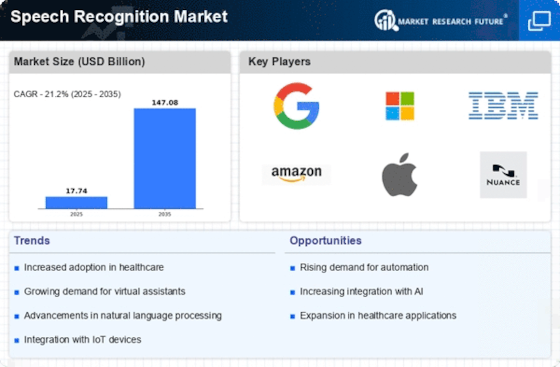Top Industry Leaders in the Speech Recognition Market

Competitive Landscape of the Speech Recognition Market:
The speech recognition market is experiencing explosive growth, fueled by the ubiquitous presence of smart devices, burgeoning demand for voice assistants, and continuous advancements in artificial intelligence (AI). This dynamic landscape is characterized by fierce competition among established tech giants, innovative startups, and niche players, each vying for a slice of the pie.
Some of the Speech Recognition companies listed below:
- Nuance Communications Inc.
- Microsoft Corporation
- Agnitio SL
- VoiceVault
- VoiceBox Technologies Corp.
- Google Inc.
- LumenVox LLC.
- Raytheon BBN Technologies
- Advanced Voice Recognition Systems
- Sensory Inc.
- ReadSpeaker Holding B.V.
- Iflytek Co. Ltd.
- Acapela Group SA
- AT&T Inc.
- Fluent.ai Inc.
Strategies Adopted by Key Players:
In this dynamic market, companies employ various strategies to gain an edge:
- Open-source initiatives: Fostering collaboration and community development to accelerate innovation and attract talent.
- Customization and verticalization: Offering tailored solutions to specific industries and catering to diverse user needs.
- Strategic partnerships and acquisitions: Collaborating with complementary players or acquiring promising startups to expand offerings and access new markets.
- Continuous R&D investment: Investing in research and development to enhance accuracy, reduce latency, and develop new features.
- Focus on user experience: Prioritizing user-friendliness, natural language processing, and context awareness to create seamless voice interactions.
Analyzing Market Share:
To understand the competitive scenario, a thorough analysis of market share is crucial. Here are some key factors to consider:
- Technology leadership: Companies with cutting-edge deep learning algorithms and robust language models hold an edge in accuracy, adaptability to accents and dialects, and handling complex commands.
- Product portfolio breadth: Offering a diverse range of speech recognition solutions across various applications (e.g., voice assistants, dictation software, transcription services) caters to a wider customer base.
- Deployment options: Providing flexible deployment options (cloud-based, on-premise, hybrid) caters to different budget constraints, security needs, and data privacy concerns.
- Industry partnerships and integrations: Strategic collaborations with device manufacturers, software developers, and content providers expand reach and strengthen brand recognition.
- Geographical reach: Companies with a strong global presence and localized solutions tailored to specific regions and languages gain a competitive advantage.
Established Players:
Tech giants like Google, Amazon, Apple, and Microsoft dominate the market with their advanced AI capabilities and established ecosystems. Google's Assistant and Amazon's Alexa are household names, while Apple's Siri and Microsoft's Azure Speech Services cater to specific niches. These companies leverage their vast resources to invest in R&D, acquire promising startups, and integrate speech recognition into their existing product offerings.
Emerging Players:
The market is witnessing an influx of innovative startups offering specialized solutions and targeting specific verticals. Notable examples include:
- Nuance Communications: Focuses on healthcare and enterprise applications with HIPAA-compliant speech recognition solutions.
- Deepgram: Employs advanced acoustic modeling for superior accuracy in noisy environments, catering to the legal and media sectors.
- Speechmatics: Develops multilingual speech recognition engines for global reach and specializes in low-resource languages.
- Sensory: Offers voice authentication and biometrics solutions for enhanced security applications.
Niche Players:
Niche players cater to specific needs and address limitations of larger companies. For instance, some focus on:
- Dialect-specific recognition: Addressing the underserved market of languages with diverse dialects and accents.
- Privacy-focused solutions: Offering on-device speech recognition for users concerned about data security.
- Vertical-specific applications: Developing speech recognition solutions tailored to healthcare, education, or customer service.
Latest Company Updates:
On Oct. 11, 2023- Achronix Semiconductor Corporation, a leading provider of high-performance FPGAs and embedded FPGA (eFPGA) IP, announced its latest innovation, FPGA-powered accelerated automatic speech recognition solution. Achronix developed this technology in partnership with Myrtle.ai, a developer of accelerated automatic speech recognition (ASR) solution based on the Speedster7t FPGA. This real-time streaming speech-to-text solution delivers extremely low latency and exceptional word-error rate while operating on over 1,000 concurrent audio streams.
On Sep.20, 2023- Roblox, a 3D immersive communication and connection platform provider, announced the acquisition of a speech recognition firm, Speechly. This acquisition will enable Roblox to enhance its voice features, including voice chat, and improve spoken language moderation in real-time. The addition of Speechly's AI expertise will help Roblox meet the scale, real-time, and dynamic needs of its user-generated content (UGC) platform.
With its speech recognition product and solutions, Speechly has enabled a fast, real-time, and cost-efficient voice moderation solution, helping developers reduce toxic behavior in online communities. Roblox addresses the challenge of moderating spoken language in real-time. It aims to provide a safe and civil environment to its daily active user base of 65.5 million by incorporating new voice features, such as voice chat.
On Sep.12, 2023- Echo Labs, a new data and AI accelerator startup, announced raising $250,000 to build an AI that can recognize & transcribe speech in real-time. Earlier this year, Echo Labs raised over US $2 million in pre-seed funding. The company has also been accepted into several technology accelerator programs. Echo Labs will use this funding to develop a solution enabling real-time human-level AI transcripts.
In Aug. 2023- Meta unveiled an AI model that performs speech and text translations for nearly 100 languages. This innovative model supports speech recognition, speech-to-speech translation, speech-to-text translation, text-to-text translation, and text-to-speech translation.









